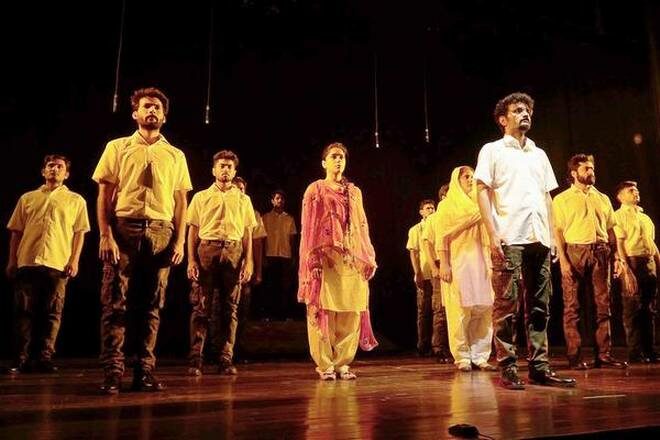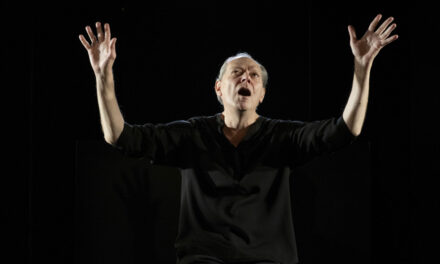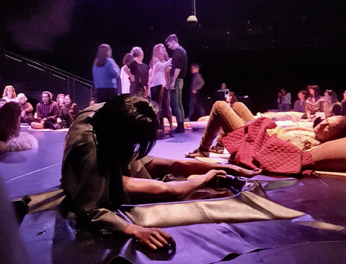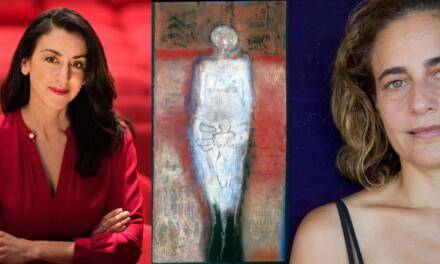Piyush Mishra’s Gagan Damama Bajyo centers around the young freedom fighter’s ideology of universal brotherhood, anarchism, atheism and fierce patriotism.
The shenanigans of the past week have pitched the martyred triumvirate of Bhagat Singh, Shivaram Rajguru and Sukhdev Thapar opposite Hindu ideologue Veer Savarkar as long gone nominees for the Bharat Ratna, looking to add to the growing track record of posthumous conferments of the country’s highest civilian award.
While these endowments have mostly occurred within a few years of an honouree’s demise, towering personalities like Vallabhbhai Patel, Jayaprakash Narayan, Gopinath Bordoloi or Madan Mohan Malviya have been bestowed their Presidential citations decades after their passing, often by partisan-minded governments attempting to score political points (as is essentially the case this week).
New production
Almost on cue, but likely programmed weeks in advance, a musical based on Singh’s short but impactful life will open this weekend as part of this year’s edition of the annual Prithvi Theatre Festival. Presented by the events company Tamboo, Gagan Damama Bajyo is written and directed by Piyush Mishra. Quite appropriately, the title refers to a Sikh battlefield refrain attributed to Kabir in the Guru Granth Sahib.
Penned in 1994, and helmed by N.K. Sharma for his theatre group, Act One, the play has since seen umpteen iterations — it is one of Mishra’s most performed scripts, alongside his Broadway adaptations in circulation. This new production marks the first time Mishra has taken over the reins of his play, and it comes after a hiatus of 16 years from the stage. In that period, the actor-composer has consolidated his position as one of Hindi cinema’s most multi-faceted talents.
The meticulously researched Gagan Damama Bajyo contributed substantively to Raj Kumar Santoshi’s historical, The Legend of Bhagat Singh (2002). The film’s dialogues were Mishra’s first writing credit for cinema. Tamboo’s revival opened in Delhi in September at the Shri Ram Centre. In keeping with the abbreviated life span of its subject (Singh died at just 23), it has a youthful cast of actor-singers who bring to the fore the idealism and passions of a new generation of non-conformists who attempted to take their country’s destiny into their own hands. There are only two female actors in a cast of sixteen, with Singh’s fiancée, Mannewali, making a fleeting but crucial appearance. The play opens with the lamentations of a mother who has lost her sons and is seen through the eyes of Shiv Verma, the last man standing among Singh’s collaborators when the play was first staged (Verma passed away in 1997).
Documenting struggle
The play’s narrative is completely non-linear, and Verma’s recollections take us all the way back to the tumultuous years from 1925 to 1931. The Kakori train robbery, the Central Assembly bombings, the inadvertent killing of John Saunders, the hunger strike in Lahore prison, and finally, the execution of Singh and his associates, all throw up a constellation of memorable characters in crisp white shirts and brown trousers — many of them young revolutionaries who have etched an indelible space for themselves in India’s freedom struggle. Mishra’s compositions are songs of rebellion that will emotionally amplify the fervor of a lost tribe’s allegiance to an unborn nation.
A telling phrase from the blurb states that the play, “breaks the fundamentalist image of [Singh] that people currently overuse and instead, shows him as a friend, a son, a lover and an intellectual.” Singh’s well-documented refusal of clemency stands in sharp contrast to Savarkar’s decamping from the freedom struggle, once released by the British from a colonial prison in Port Blair. There is great irony, therefore, to the latter being hailed as a nationalist icon by the powers-that-be. Singh’s patriotism was beyond reproach, but his strident ideological moorings of universal brotherhood, anarchism and atheism would mark him out as a stark misnomer in today’s political climate, which calls the lie on those across the left-to-right political spectrum who’ve tried to assert ownership over his legacy time and again. In restoring Singh to his every-man roots, Mishra’s play would likely allow him to be claimed by ordinary folk who lie outside these affiliations.
Gagan Damama Bajyo will premiere as part of the Prithvi Theatre Festival on November 3 at the Royal Opera House and be staged at Prithvi Theatre on November 4 and 5. For more details, see bookmyshow.com
This article was originally posted at http://thehindu.com and has been reposted with permission. To read the original article, click here.
This post was written by the author in their personal capacity.The opinions expressed in this article are the author’s own and do not reflect the view of The Theatre Times, their staff or collaborators.
This post was written by Vikram Phukan.
The views expressed here belong to the author and do not necessarily reflect our views and opinions.


















